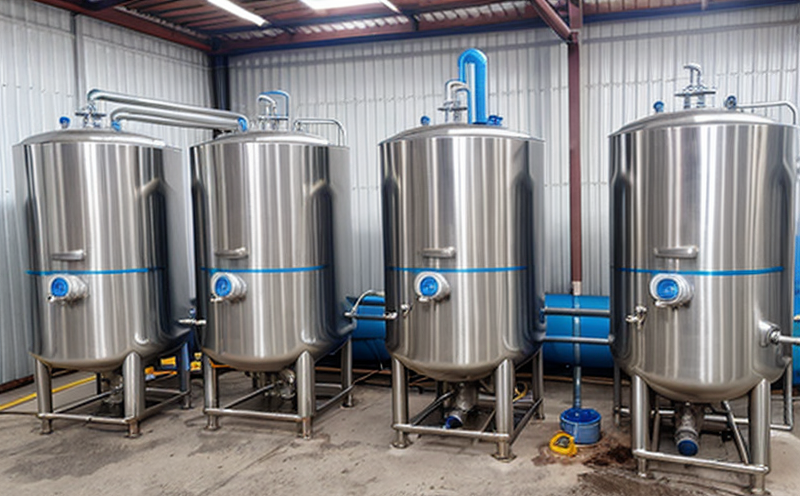ISO 10523 pH Measurement Test in Boiler Water
The ISO 10523 standard provides a robust framework for measuring and controlling the pH of boiler water, which is crucial for maintaining optimal operating conditions and preventing corrosion in boilers. The primary goal of this test is to ensure that the pH levels are within specified limits, thereby safeguarding against potential equipment failure and operational inefficiencies.
Boiler water plays a critical role in industrial processes by providing heat through steam generation. However, the presence of dissolved salts, minerals, and other impurities can lead to corrosion if not properly managed. The pH level is one of the key parameters that influence this process. A neutral or slightly alkaline pH (between 9 and 10) helps inhibit the formation of acidic compounds that could corrode boiler surfaces.
The ISO 10523 standard outlines precise procedures for measuring pH, ensuring accurate and repeatable results. This involves using a combination of reagents and electronic meters to achieve reliable readings. The testing process typically includes:
- Sampling the boiler water at regular intervals
- Pre-treating the sample (if necessary) to ensure it is free from interfering substances
- Using a pH meter or test kit with appropriate electrodes and reagents
- Calibrating the equipment according to manufacturer specifications
- Recording the measured pH values and comparing them against acceptance criteria
The importance of this testing cannot be overstated. Poorly controlled pH levels can lead to:
- Increased corrosion rates, leading to premature equipment failure
- Reduction in boiler efficiency and increased energy costs
- Increased maintenance requirements due to frequent repairs and replacements
- Potential environmental impact from leaking chemicals or contaminants
By adhering to the ISO 10523 standard, organizations can mitigate these risks. Regular monitoring allows for proactive management of pH levels, ensuring that corrective actions are taken before any significant issues arise.
The testing process is not only important for industrial applications but also extends to commercial and residential settings where boilers are used. Maintaining proper pH levels ensures the longevity of equipment and contributes to a safer working environment.
Applied Standards
The ISO 10523 standard is widely recognized for its stringent requirements in measuring pH values, especially in boiler water. It provides clear guidelines on the selection of appropriate equipment and methods to ensure accurate measurements.
In addition to ISO 10523, other relevant standards include:
- ASTM G43-98 (Standard Practice for Conducting Electrochemical Tests in Corrosion Environments)
- EN 14048:2017 (Method of Sampling Condensate and Boiler Feedwater from Steam Generating Plant Boilers)
The application of these standards ensures that all testing procedures are consistent with industry best practices. This consistency is vital for ensuring accurate results, which can then be used to make informed decisions about boiler maintenance and operation.
Eurolab Advantages
At Eurolab, we pride ourselves on offering comprehensive testing services that adhere strictly to international standards like ISO 10523. Our team of experts ensures that each test is conducted with precision and accuracy.
- We provide rapid turnaround times for our clients, allowing them to receive results promptly
- Our laboratories are equipped with state-of-the-art equipment, ensuring reliable and consistent measurements
- We offer detailed reports that include all relevant data points, making it easier for clients to understand the implications of their test results
- Our team provides expert advice on how to interpret the results and implement necessary corrective actions
By choosing Eurolab for your ISO 10523 pH Measurement Test in Boiler Water, you can be confident that you are receiving top-tier service from a reputable laboratory. Our commitment to quality and excellence ensures that all tests meet the highest standards.
Customer Impact and Satisfaction
- Informed Decision-Making: Accurate pH measurements enable customers to make informed decisions regarding boiler maintenance and operation. This leads to more efficient use of resources and reduced costs.
- Improved Safety: By ensuring that pH levels are within acceptable limits, we contribute to a safer working environment for all personnel involved in the process.
- Enhanced Equipment Lifespan: Properly controlled pH levels can significantly extend the lifespan of boilers and other related equipment, reducing the need for frequent replacements.
- Environmental Responsibility: Maintaining optimal pH levels helps minimize the environmental impact associated with industrial operations. This aligns with broader sustainability goals.





